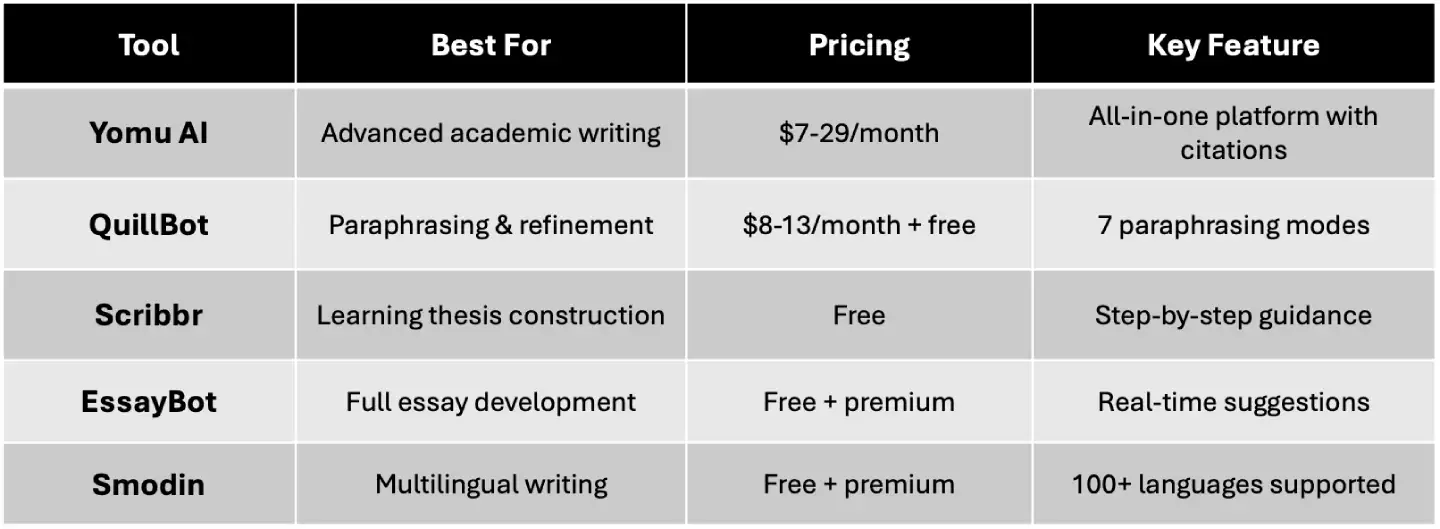Creating a compelling thesis statement remains one of the most challenging aspects of academic writing. A strong thesis statement generator can transform this daunting task into a manageable process, helping students and researchers articulate their central arguments with precision and clarity. With the rapid advancement of artificial intelligence in 2025, these tools have evolved to offer sophisticated features that go beyond simple sentence construction.
Academic writers across disciplines—from undergraduate students to seasoned researchers—face the pressure of condensing complex ideas into concise, debatable statements. Modern thesis statement generators leverage AI technology to analyze topics, suggest argument structures, and provide real-time feedback on clarity and coherence. These digital assistants have become indispensable for anyone seeking to establish a solid foundation for their research papers, dissertations, or academic publications.
The landscape of thesis generation tools has transformed dramatically, with AI-powered platforms offering unprecedented accuracy and customization options. Understanding which tools deliver the best results can significantly impact your academic success and writing efficiency.
The integration of artificial intelligence into academic writing has revolutionized how students approach thesis development. AI tools help you identify the strongest arguments within your research topic while ensuring your thesis meets academic standards for specificity and debatability. These sophisticated systems analyze vast databases of successful academic papers to understand what makes a thesis statement effective.
Modern AI answer generator technology excels at breaking down complex research topics into manageable components. The algorithms can identify key themes, suggest counterarguments, and help writers navigate the delicate balance between being too broad or too narrow in their claims. This level of analytical support proves invaluable for students struggling with writer's block or those new to academic writing conventions.
Advanced thesis generators now incorporate natural language processing to ensure generated statements maintain academic tone while remaining accessible. The technology has progressed beyond simple template filling to offer genuine analytical assistance that adapts to different academic disciplines and writing requirements.
Key benefits of AI-powered thesis generators
- Instant feedback on argument strength and clarity
- Customizable templates for different essay types and academic fields
- Real-time suggestions for improving specificity and focus
- Integration capabilities with research databases and citation tools
- Time-saving automation that accelerates the writing process
The market for thesis statement generators has exploded in 2025, with numerous platforms competing for academic writers' attention. After extensive analysis, five tools stand out for their innovative features, user experience, and proven results in helping students craft compelling thesis statements.
These leading platforms combine sophisticated AI algorithms with user-friendly interfaces to deliver thesis statements that meet rigorous academic standards. Each tool offers unique advantages, from specialized subject area support to advanced plagiarism detection capabilities that ensure originality in your academic work.
When evaluating these tools, factors such as AI sophistication, customization options, integration capabilities, and pricing models become crucial considerations. The most effective platforms balance automation with user control, allowing writers to maintain their voice while benefiting from AI-powered insights.
Essential features to consider when selecting a thesis generator
- AI sophistication level and accuracy of generated statements
- Subject-specific templates for various academic disciplines
- Integration options with writing platforms and research tools
- Plagiarism detection and originality verification features
- Pricing structure and value for money considerations

Yomu AI represents the pinnacle of integrated academic writing assistance, offering a thesis statement generator that seamlessly connects with comprehensive research and writing tools. The platform's advanced feedback engine analyzes thesis statements for clarity, logical flow, and academic rigor, providing actionable suggestions that elevate your writing quality beyond basic grammar corrections.
The AI answer generator component within Yomu AI excels at helping users develop nuanced arguments by suggesting evidence-based support and identifying potential counterarguments. This feature proves particularly valuable for complex research topics requiring sophisticated analytical frameworks. The platform's ability to maintain academic tone while ensuring accessibility makes it suitable for writers across different experience levels.
Yomu AI's integration with Sourcely provides seamless citation management, allowing users to insert properly formatted references directly into their documents without leaving the platform. The built-in plagiarism checker goes beyond simple matching, offering detailed similarity reports that help maintain academic integrity while providing guidance on proper paraphrasing techniques.
Key advantages of Yomu AI
- Advanced feedback engine for thesis refinement and academic tone optimization
- Integrated citation management with automatic formatting across multiple styles
- Comprehensive plagiarism detection with detailed similarity analysis
- Export flexibility supporting PDF, Word, and LaTeX formats
- All-in-one platform eliminating the need for multiple writing tools
Pricing: Visit official website for current pricing - plans typically range from $7-29/month with free starter options
2. QuillBot Thesis Generator: AI-Powered Precision and Paraphrasing Excellence
QuillBot's thesis statement generator distinguishes itself through sophisticated AI technology that creates specific, debatable statements tailored to your research focus. The platform's strength lies in its ability to analyze complex topics and generate nuanced arguments that capture the essence of your research while maintaining academic precision.
The integrated paraphrasing tools within QuillBot make full use of AI technology to help refine generated thesis statements, ensuring they align perfectly with your writing style and academic requirements. This combination of generation and refinement capabilities sets QuillBot apart from simpler thesis creation tools that offer limited customization options.
QuillBot's multiple writing modes allow users to adjust tone and complexity levels, making it suitable for different academic contexts and audience expectations. The platform's grammar and style checking features ensure that generated thesis statements meet professional standards while maintaining clarity and impact.
Notable features of QuillBot
- AI-powered generation with advanced natural language processing
- Seven paraphrasing modes for customizing tone and complexity
- Grammar and style integration for polished final results
- Multiple writing contexts supporting various academic disciplines
- User-friendly interface with intuitive navigation and controls
Pricing: Check official website for current rates - typically $8-13/month depending on billing cycle, with free tier available
3. Scribbr Thesis Statement Generator: Educational Excellence and Guided Development
Scribbr takes a uniquely educational approach to thesis statement generation, guiding users through a question-based process that develops critical thinking skills alongside practical writing abilities. This methodology helps users understand the fundamental principles of effective argumentation rather than simply providing automated solutions.
The platform's step-by-step guidance proves invaluable for students learning to construct complex academic arguments. How do AI detectors work in academic settings becomes less of a concern with Scribbr's transparent process, which emphasizes original thinking and proper argument development rather than relying solely on automated generation.
Scribbr's completely free access model makes it particularly attractive for budget-conscious students while maintaining high-quality output standards. The platform provides extensive examples and templates that illustrate effective thesis construction across various academic disciplines and essay types.
Educational benefits of Scribbr
- Question-based guidance promoting critical thinking development
- Completely free access with no registration requirements
- Extensive examples library covering multiple academic disciplines
- Transparent process building understanding of thesis construction principles
- No hidden costs or upselling to premium services
Pricing: Completely free - no subscription required

EssayBot delivers a sophisticated thesis statement generator that integrates seamlessly with its comprehensive essay writing platform. The tool excels at guiding users through step-by-step thesis development while providing real-time suggestions and improvements throughout the writing process. This dynamic approach makes it particularly valuable for students experiencing writer's block or those struggling to articulate complex research ideas concisely.
The platform's AI algorithms analyze essay topics to generate multiple potential thesis statements, allowing users to compare different approaches and select the most compelling option. AI tools help you refine these initial suggestions through iterative feedback, ensuring the final thesis statement captures the nuances of your argument while maintaining academic rigor and clarity.
EssayBot's integration with its broader writing platform provides significant workflow advantages, allowing users to seamlessly transition from thesis creation to full essay development. This unified approach ensures consistency between the thesis statement and supporting evidence while maintaining coherent argumentation throughout the entire document.
Distinctive features of EssayBot
- Step-by-step guided process with real-time suggestions and improvements
- Multiple thesis options for comparison and selection
- Seamless platform integration from thesis to full essay development
- Topic analysis capabilities for generating relevant, focused statements
- Interactive refinement tools for iterative improvement and customization
Pricing: Free basic version available - check website for premium subscription details
5. Smodin: Multilingual Academic Writing Support with Template-Driven Approach
Smodin stands out in the thesis statement generator landscape through its template-driven methodology and extensive multilingual support, making it invaluable for international students and researchers working across language barriers. The platform offers over 100 language options while maintaining academic writing standards and providing culturally appropriate argumentation structures.
The template-based approach allows users to explore different research angles and argument structures, making it particularly effective for brainstorming sessions and early-stage thesis development. How do AI detectors work becomes less concerning with Smodin's emphasis on original content creation through guided template customization rather than automated text generation.
Smodin's strength lies in its ability to adapt thesis statement structures to different academic disciplines and cultural writing conventions. This flexibility proves essential for international collaborations and cross-cultural research projects where argument presentation may vary significantly across different academic traditions.
Key advantages of Smodin
- Multilingual support across 100+ languages with cultural adaptation
- Template-driven approach encouraging original thinking and customization
- Cross-cultural compatibility for international academic collaboration
- Discipline-specific structures tailored to various academic fields
- Brainstorming enhancement through multiple angle exploration capabilities
Pricing: Free basic access available - visit website for premium feature pricing
How Do AI Detectors Work in Academic Integrity Assessment
Understanding how AI detectors work becomes increasingly important as thesis statement generators become more sophisticated. Academic institutions have implemented advanced detection systems that analyze writing patterns, vocabulary usage, and argument structure to identify potentially AI-generated content.
Modern AI detection tools examine linguistic patterns, sentence complexity, and coherence markers that distinguish human writing from machine-generated text. These systems have evolved to recognize the characteristic signatures of different AI writing platforms, making it crucial for students to understand how to use thesis generators ethically and effectively.
The key to successful integration of AI tools lies in using them as writing assistants rather than content creators. Effective thesis statement generators should inspire and guide your thinking while allowing your unique perspective and analytical skills to shape the final argument.
- Using generators as brainstorming aids rather than final solutions
- Personalizing generated content with your unique insights and research
- Transparent disclosure when required by institutional policies
- Combining AI assistance with traditional research and writing methods
- to ensure authenticity and accuracy

Maximizing the Benefits: How to Make Full Use of AI Thesis Generators
Learning to make full use of AI thesis generators requires understanding their capabilities and limitations while developing strategies for optimal integration into your writing process. The most successful academic writers treat these tools as sophisticated brainstorming partners rather than replacement solutions for critical thinking and analysis.
Effective utilization begins with thorough preparation before engaging with any thesis generator. Clearly defining your research topic, identifying key arguments, and understanding your assignment requirements enables AI tools to provide more targeted and relevant suggestions. This preparation phase significantly improves the quality of generated thesis statements.
Advanced users develop systematic approaches to refining AI-generated content, combining multiple tools and techniques to achieve optimal results. This might involve using one platform for initial generation, another for paraphrasing and refinement, and traditional research methods for fact-checking and argument validation.
Strategic approaches for maximum effectiveness
- Pre-tool preparation with clear topic definition and argument mapping
- Multi-tool integration combining different platforms for comprehensive support
- Iterative refinement through multiple revision cycles and feedback incorporation
- Expert consultation when tackling complex or specialized topics
- Quality assessment using academic writing criteria and peer review
FAQs
A1: Scribbr’s generator is ideal if you prefer structured, educational support and clear rhetorical guidance rather than fully automated AI suggestions.
A2: Yes—QuillBot integrates AI thesis suggestion with paraphrasing and grammar tools, allowing customization of tone and readability alongside the thesis statement.
A3: Most offer free basic thesis generation, with paid tiers unlocking advanced features—e.g. EssayBot, QuillBot, Jenni AI, and Sopaper-writing platforms; others like Scribbr and PapersOwl remain free for basic use.
A4: Jenni AI offers real‑time interactive feedback and refinement as you adjust your thesis inputs and statements for greater clarity and alignment with academic standards.
A5: PapersOwl and PerfectEssayWriter.ai are among the quickest—enter your topic details and get a clear, focused statement within seconds, with no registration required.
Conclusion: Choosing Your Ideal Thesis Statement Generator for Academic Success
The landscape of thesis statement generators in 2025 offers unprecedented opportunities for academic writers to enhance their work quality and efficiency. From comprehensive platforms like Yomu AI to specialized educational tools like Scribbr, each option provides unique advantages for different writing contexts and user preferences.
The most effective approach involves matching tool capabilities with your specific academic needs, writing experience, and budget constraints. Advanced users might benefit from feature-rich platforms that integrate multiple writing functions, while beginners may find success with simpler, guidance-focused tools that emphasize learning and skill development.
Success with thesis statement generators ultimately depends on maintaining the balance between leveraging AI assistance and preserving your unique analytical voice. These tools excel as research and brainstorming partners, but the most compelling thesis statements emerge when technology enhances rather than replaces human insight and creativity.
The future of academic writing lies in the intelligent integration of AI assistance with traditional scholarly methods. By understanding the strengths and limitations of available tools, academic writers can harness technology to produce more compelling, well-structured, and impactful thesis statements that advance their research goals and academic success.
Remember that the strongest thesis statements emerge from the combination of technological assistance and human expertise, creating arguments that resonate with readers while meeting the highest standards of academic excellence.
 Submit Your AI Tool For FREE!Showcase Your Innovation To Thousands Of AI Enthusiasts!
Submit Your AI Tool For FREE!Showcase Your Innovation To Thousands Of AI Enthusiasts! Submit Your AI Tool For FREE!Showcase Your Innovation To Thousands Of AI Enthusiasts!
Submit Your AI Tool For FREE!Showcase Your Innovation To Thousands Of AI Enthusiasts! Submit Your AI Tool For FREE!Showcase Your Innovation To Thousands Of AI Enthusiasts!
Submit Your AI Tool For FREE!Showcase Your Innovation To Thousands Of AI Enthusiasts! Submit Your AI Tool For FREE!Showcase Your Innovation To Thousands Of AI Enthusiasts!
Submit Your AI Tool For FREE!Showcase Your Innovation To Thousands Of AI Enthusiasts! Submit Your AI Tool For FREE!Showcase Your Innovation To Thousands Of AI Enthusiasts!
Submit Your AI Tool For FREE!Showcase Your Innovation To Thousands Of AI Enthusiasts!






No comments yet. Be the first to comment!